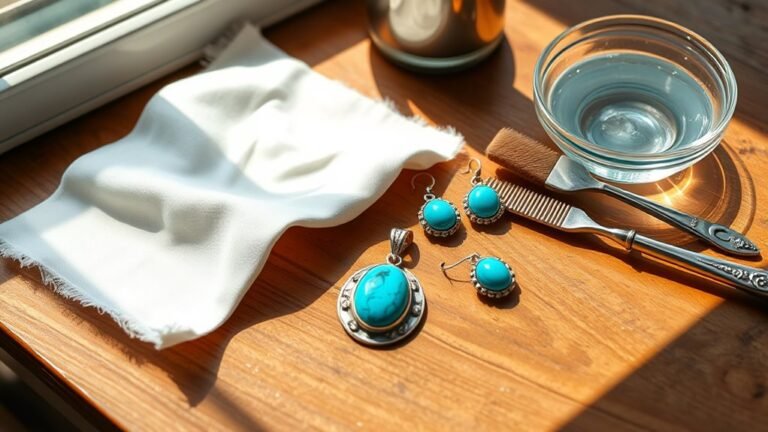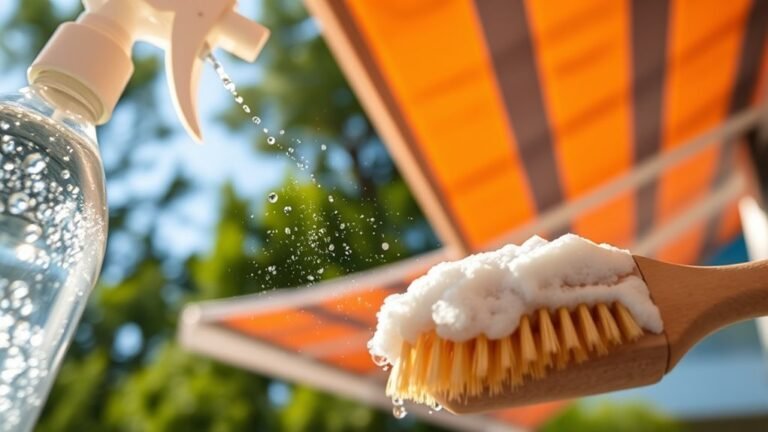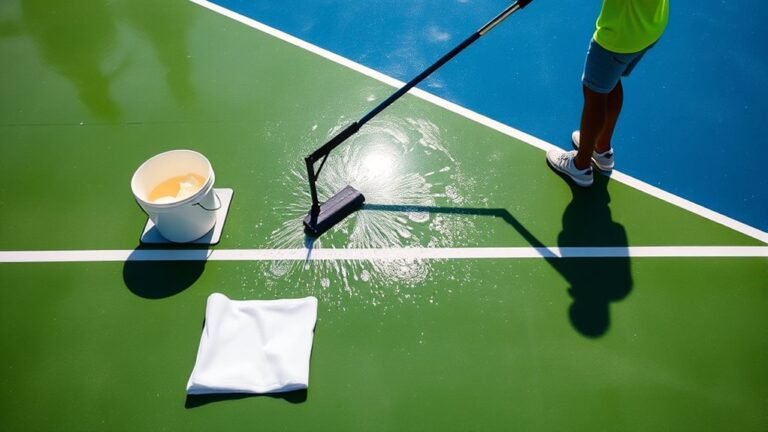How to Clean Pool Cage Screens
To clean your pool cage screens effectively, gather a soft-bristle brush, a pH-neutral cleaning solution, and a hose with a nozzle. Apply the cleaning solution evenly, allowing it to sit for 5-10 minutes. Gently scrub the screens, focusing on corners, then rinse thoroughly with the hose. Remember to wear safety gear and work in well-ventilated areas. For ongoing maintenance, implement routine cleanings and inspections. You’ll discover additional techniques to keep your screens pristine.
##
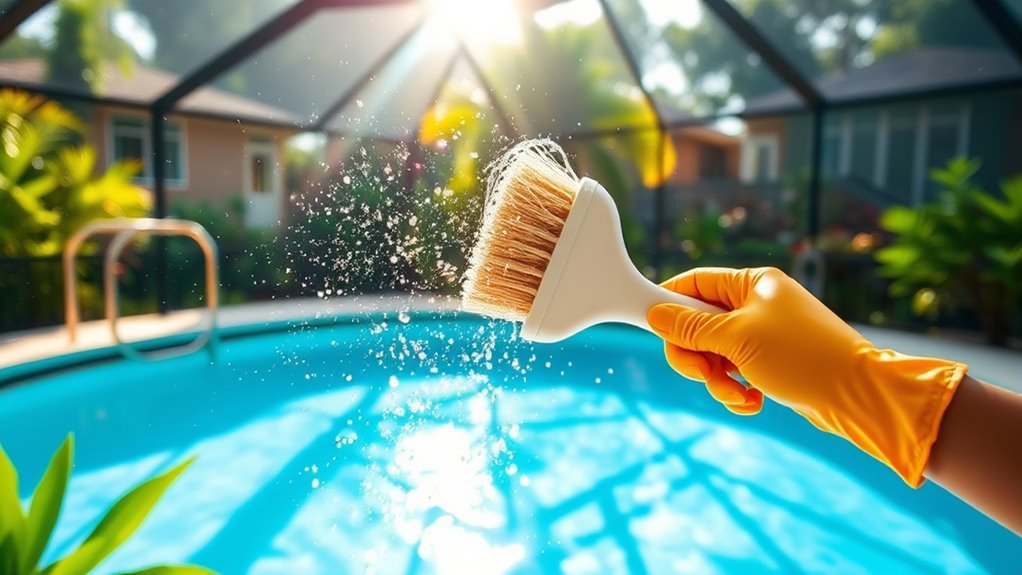
If you’re looking to keep your pool cage screens in top condition, you’ve come to the right place. This article will provide you with essential tips and techniques for cleaning and maintaining your pool cage screens, ensuring both their aesthetic appeal and functionality are preserved. You’ll learn how to effectively remove dirt, algae, and grime with easy-to-follow methods, as well as the importance of using safe cleaning products to prevent any damage. By incorporating these cleaning practices into your routine, you can enjoy a pristine outdoor space without the worry of deterioration.
Preparation For Cleaning
Before you start the cleaning process, it’s important to gather the necessary tools and supplies to guarantee an efficient and effective job. Review your cleaning schedule to verify you’re tackling the screens at the right time, ideally during cooler parts of the day. Begin with a thorough screen inspection to identify any damage or areas requiring special attention. Check for tears, rust, or debris buildup that could complicate the cleaning process. Having all your tools ready—like a soft brush, hose, and a mild cleaning solution—will streamline your efforts. Make sure to assess the type of screens you have, as this can influence the cleaning technique you’ll use. Preparation is key to achieving spotless and well-maintained pool cage screens.
Tools and Chemical Required
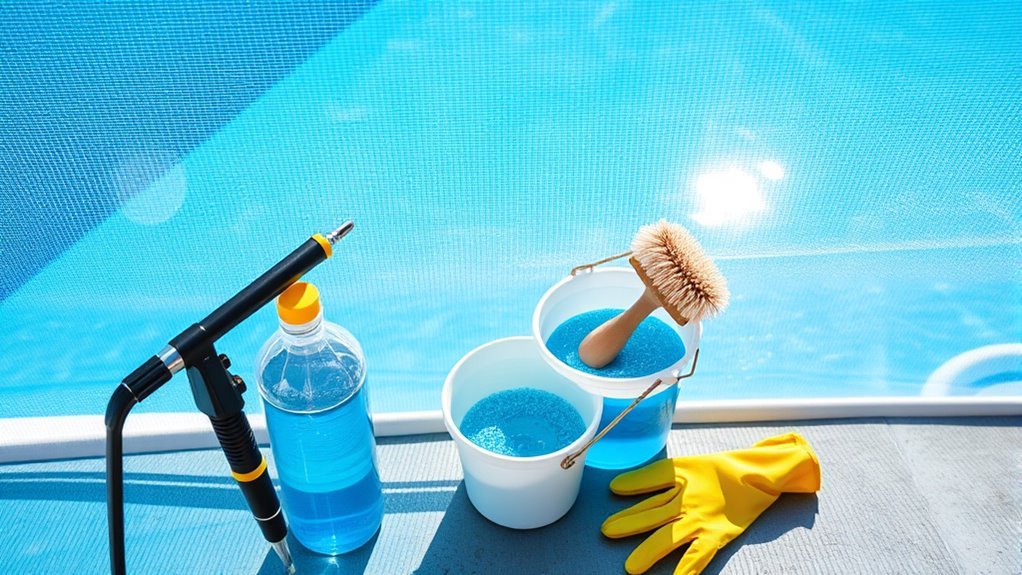
To effectively clean your pool cage screens, you’ll need a selection of specific tools and chemicals that guarantee the job is done thoroughly without causing damage. Essential items include soft scrubbing brushes for delicate screen materials and effective cleaning solutions that break down grime without harsh effects. Here’s a quick reference table to help you gather what you need:
| Tool/Chemical | Purpose | Recommended Type |
|---|---|---|
| Scrubbing Brush | Gently removes dirt and debris | Soft-bristle |
| Cleaning Solution | Breaks down tough stains | pH-neutral, non-toxic |
| Hose with Nozzle | Rinses off cleaning residue | Adjustable spray nozzle |
| Bucket | Holds cleaning solution | 5-gallon capacity |
With these tools and chemicals, you’re set for a successful cleaning session.
How to Clean:

Step 1: Gather Necessary Tools and Chemicals
- Collect all the cleaning supplies you will need before starting the process. This includes:
- A cleaning solution specifically designed for screens (you may choose a commercial product or a homemade solution).
- A soft-bristled brush or a sponge to avoid damaging the screens.
- A hose for rinsing.
- Protective gloves and goggles to ensure safety while handling chemicals.
Step 2: Apply the Cleaning Solution
- Spray the selected cleaning solution generously onto the screens.
- Make sure to cover all areas evenly, focusing on spots that appear particularly dirty.
- Allow the solution to penetrate the screens for about 5-10 minutes. This waiting period helps to loosen dirt and debris, making it easier to clean.
Step 3: Scrub the Screens
- Using the soft-bristled brush, gently scrub the screens to remove dirt and debris.
- Pay special attention to corners and crevices where grime tends to accumulate.
- Use a back-and-forth motion to ensure thorough cleaning without damaging the screen material.
Step 4: Rinse Thoroughly
- After scrubbing, take your hose and rinse the screens thoroughly.
- Make sure to wash away all the cleaning solution and any dislodged dirt.
- Check that no residue remains, as leftover cleaning solution can lead to buildup over time.
Step 5: Inspect for Damages
- Once the screens are rinsed and dried, inspect them for any damages or tears.
- Look for signs of wear and issues that might need repair.
- Address any damages promptly to ensure the screens continue to function effectively.
Step 6: Maintain Regular Upkeep
- To prolong the lifespan of your pool cage screens and maintain their appearance, aim to clean them every few months.
- Regular cleaning helps prevent buildup and keeps your pool area looking fresh and inviting.
- Make a schedule for upkeep to ensure you do not overlook this important maintenance task.
- Additionally, improving indoor ventilation can help reduce moisture buildup around screens, preventing mold and mildew growth.
Safety Consideration
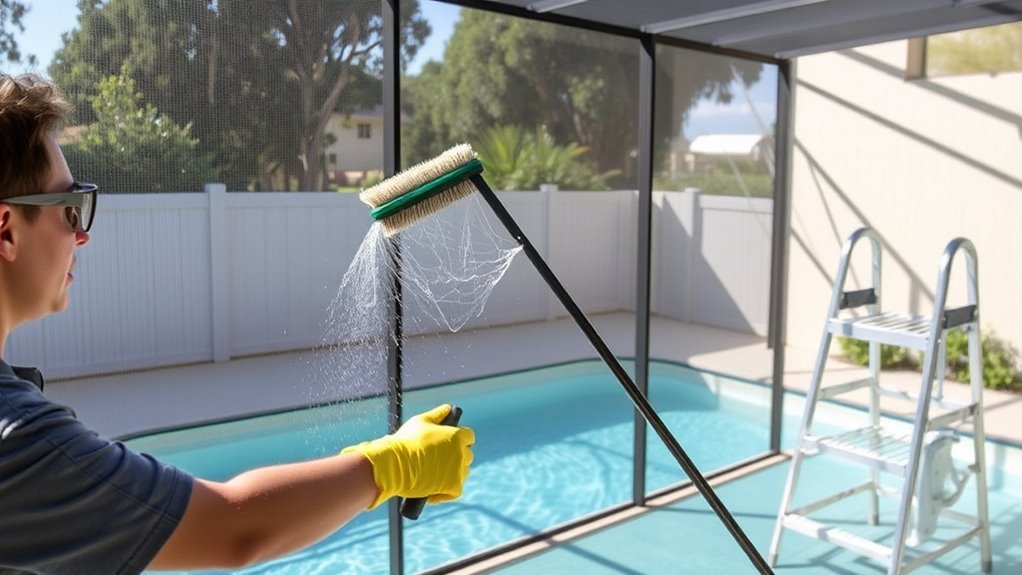
When cleaning pool cage screens, safety should be a top priority. Start by wearing appropriate safety gear, including gloves, goggles, and non-slip footwear. These items protect you from potential injuries and hazardous chemical exposure. If you’re using cleaning agents, read the labels carefully to understand proper chemical handling procedures. Always work in a well-ventilated area to avoid inhaling any fumes. Consider using a ladder cautiously if you need to reach high areas; verify it’s stable and secure before ascending. Also, maintain a clear workspace to prevent tripping hazards. By prioritizing safety, you not only protect yourself but also guarantee a smooth, efficient cleaning process, allowing you to enjoy your pool cage screens without worry.
Tips to keep clean for long time
After ensuring your safety while cleaning pool cage screens, implementing effective maintenance practices can greatly extend their cleanliness. Start with preventive maintenance; a routine schedule of cleaning and inspections will help you catch dirt buildup early. Perform regular inspections to identify any damage or wear in the screens, which can lead to larger issues if neglected. Use a soft brush or cloth to wipe down the screens weekly, removing dust and debris before they accumulate. Additionally, consider applying a protective coating every few months to help repel dirt. Finally, avoid using harsh chemicals, as they can degrade the screen material. Keeping your screens dry and well-ventilated will also prevent mold and mildew growth. By following these steps, you’ll maintain your pool cage screens in excellent condition, allowing you to enjoy your space freely.
Frequently Asked Questions
How Often Should I Clean My Pool Cage Screens?
You should clean your pool cage screens at least once every three months for ideal maintenance. However, if you notice dirt or debris accumulating sooner, don’t hesitate to clean them more frequently. Regular cleaning frequency helps prevent buildup that can damage the screens over time. Use gentle cleaning solutions and soft brushes to maintain their integrity. Following these maintenance tips guarantees your pool area stays inviting and free from unwanted pests.
Can I Use a Pressure Washer for Cleaning?
You can use a pressure washer for cleaning your pool cage screens, but be cautious. Think of it like a race car; too much speed can cause damage. Use low pressure settings to avoid tearing the screen material. When applying pressure washer tips, keep the nozzle at least 12 inches away for effective screen maintenance. This method saves time but always check for any loose parts before you start, ensuring everything stays intact.
Will Cleaning Solutions Damage My Screens?
Cleaning solutions can potentially damage your screens, depending on the screen materials and solution types you use. It’s vital to avoid harsh chemicals, as they can degrade aluminum or vinyl screens. Opt for mild detergents or specialized cleaners designed for your screen’s material. Always test a small area first to guarantee compatibility. Remember, maintaining your screens is all about finding the right balance between effective cleaning and preserving their integrity.
What Type of Screens Are Easiest to Clean?
Aluminum and vinyl screens are the easiest to clean due to their smooth surfaces and durability. You’ll want to use soft-bristle brushes and non-abrasive cleaning tools to avoid scratching. For aluminum, a mild detergent mixed with water works well, while vinyl may require a specialized cleaner. Regular maintenance is key, so consistent cleaning will keep your screens looking great and functioning properly, allowing you the freedom to enjoy your pool area without hassle.
Can I Hire Professionals for Pool Cage Screen Cleaning?
Absolutely, you can hire professionals for pool cage screen cleaning! Choosing expert cleaners can save you time and guarantee thoroughness. While cost considerations vary, the professional benefits often outweigh expenses, delivering sparkling screens without the hassle. Imagine the freedom of enjoying your pristine pool area without worrying about dirt or debris. Professionals use specialized equipment and techniques, assuring a job well done, so you can plunge into relaxation rather than scrubbing away grime.


